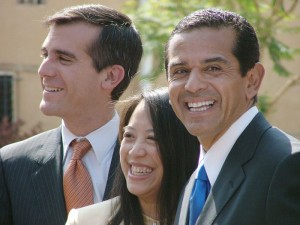Our History

Recognizing the need for culturally and linguistically appropriate social and human services for the more economically disadvantaged sectors of the Thai community to become self-sufficient and culturally proficient, Thai CDC initially began providing legal and emergency relief services, crisis counseling and intervention, advocacy, cultural orientation and language assistance when it was first founded in 1994. These programs and services targeting low-income Thai immigrants included our Self-Sufficiency Services, Family Services, Housing and Community Economic Development, and Youth Services. Our Self-Sufficiency Services helped Thai immigrants overcome the language and cultural barriers preventing them from successfully integrating into mainstream society and becoming independent and self-reliant. These services included case management, crisis counseling and intervention, cultural orientation, information and referrals, language assistance and instruction, legal consultation, survival skills development, and housing and job search and placement assistance. Our Family Services included an Immigrant Family Adjustment Program, Immigrant Families Matter, Immigrant Schooling Counts, Family-Based Advocacy and a Parent Education Program.
Thai CDC was specifically established to begin addressing the health and human service needs of the Thai population. Within the context of all services that are either extremely limited or totally absent, the following service priorities were determined and ranked in the following order at the time: 1) Health and Human Services; 2) Legal Services; 3) Senior Services and 4) Youth Services.
Since its establishment, Thai CDC has addressed the multifaceted needs of Thai immigrants in the Southern California region, who, at an estimated population of 100,000 are considered the largest number of Thais living abroad.
Through our broad range of social and human services (i.e., cultural orientation, language assistance, survival skills development, crisis intervention, parent education, family preservation strategies, cross-cultural mediation and dispute resolution), we have assisted newcomers with the cultural and transitional issues that serve as barriers to successful integration in a new culture. Our education and advocacy efforts (i.e., legal clinics, redress and restitution for workers, humane immigration policy advocacy, reinstatement of benefits to welfare recipients) have helped to protect the rights of Thai immigrants, workers, trafficked victims, and welfare recipients. By integrating community economic development strategies (i.e. development of affordable housing, small business development assistance, financial literacy, Volunteer Income Tax Assistance, Small Business Incubation (Thai Town Marketplace), promotion of access to the formal financial sector, neighborhood reinvestment and revitalization efforts through the campaign to designate “Thai Town”), Thai CDC has made economic opportunities more accessible to Thai immigrants and increased their potential for economic mobility.
At present, there is a dearth of culturally and linguistically appropriate social services available to the Thai community in the Los Angeles area. The lack of sufficiently qualified and trained bilingual/bicultural service providers further contributes to the current poor and inadequate service delivery system. Like other recent immigrant communities, this largely monolingual population remains highly isolated and underserved in all service areas.
Besides Thai CDC, no other bilingual and bicultural services are available to meet the greatest needs in the Thai community.
Because Thais are economic immigrants and need access to opportunities to help them become self-sufficient and economically mobile, the core of our mission is community economic development.
Our Mission
The mission of Thai CDC is “to advance the social and economic well-being of low and moderate income Thais and other ethnic communities in the greater Los Angeles area through a broad and comprehensive community development strategy including human rights advocacy, affordable housing, access to healthcare, promotion of small businesses, neighborhood empowerment, and social enterprises.”
Our Vision
Thai Community Development Center was founded in April 1994 on the idea that all people have a basic right to a decent standard of living and quality of life.
Thai CDC aims to create a thriving community by creating businesses and jobs, developing decent and affordable housing, and revitalizing public space. Thai CDC serves economically disadvantaged populations including immigrants, low-wage workers, welfare recipients and victims of human trafficking. Thai CDC’s form of community development emphasizes exchange and equity not charity to enhance a community’s current skills, abilities and resources. For Thai CDC, community based economic development is a long, gradual process. It involves the cooperation of many. It is possible to have growth through and move toward equity. We aim to improve the community while returning ownership of economic decisions to the people most effected by those decisions. There is an emphasis on resources that nourish households. Community development is more than a collection of streets and buildings. It involves putting money and resources into the local community to nourish the neighborhood. We develop people, activities and institutions that enable the community to build itself up. However, building a strong independent and interdependent community requires interacting with the world at large. Therefore, we are a community development organization that “thinks globally but acts locally.”
Our Goals
Our community-based economic development strategy consists of ten separate but integrated goals:
- To empower and improve working conditions for low-income and exploited Thai workers, especially those working in inhumane conditions;
- To promote the rights of Thai Americans, as well as advocate for fair labor and immigration policies;
- To provide and ensure access to culturally sensitive social services;
- To develop leadership among Thai Americans through community service and civic engagement;
- To find innovative ways to help low-income individuals become more upwardly mobile;
- To promote economic self-sufficiency through financial literacy, entrepreneurial training, small business development, and individual development accounts (IDAs);
- To engage in community asset building that will create jobs and provide incubation opportunities for individuals to start their own micro-enterprises;
- To develop decent and affordable housing for low-income individuals and families;
- To revitalize public space through neighborhood reinvestment, community beautification and placemaking projects;
- To utilize cultural tourism and heritage marketing activities as a vehicle for economic development.

